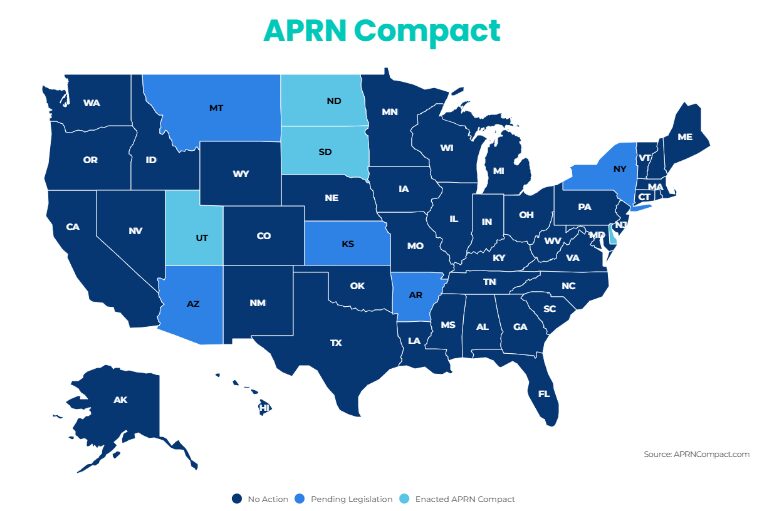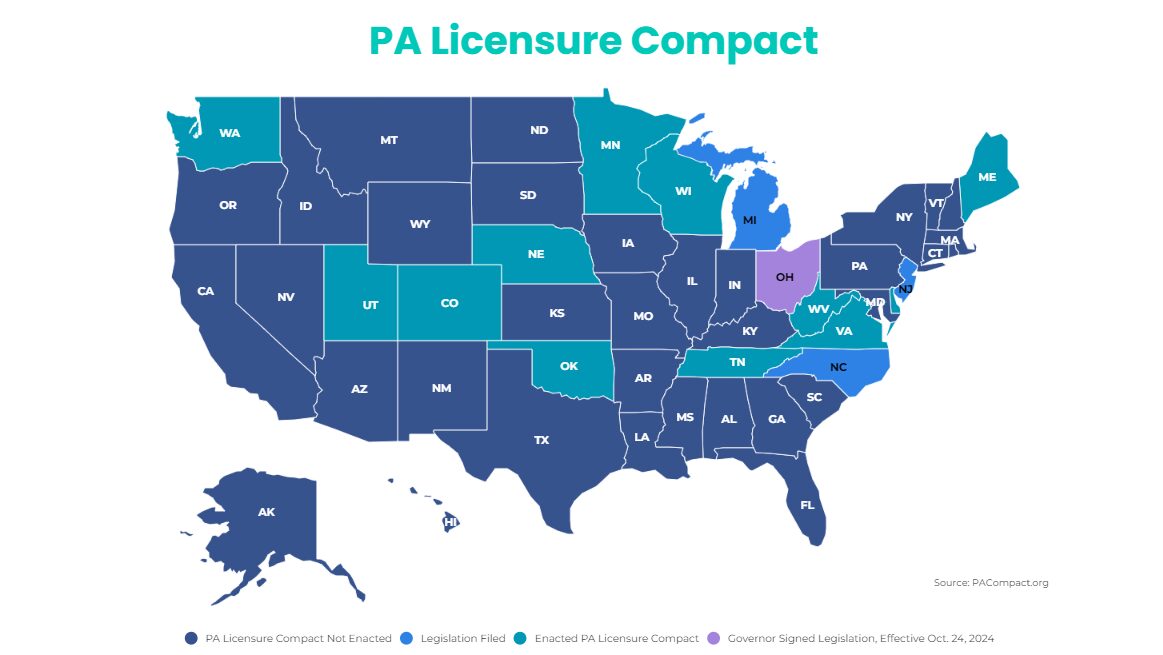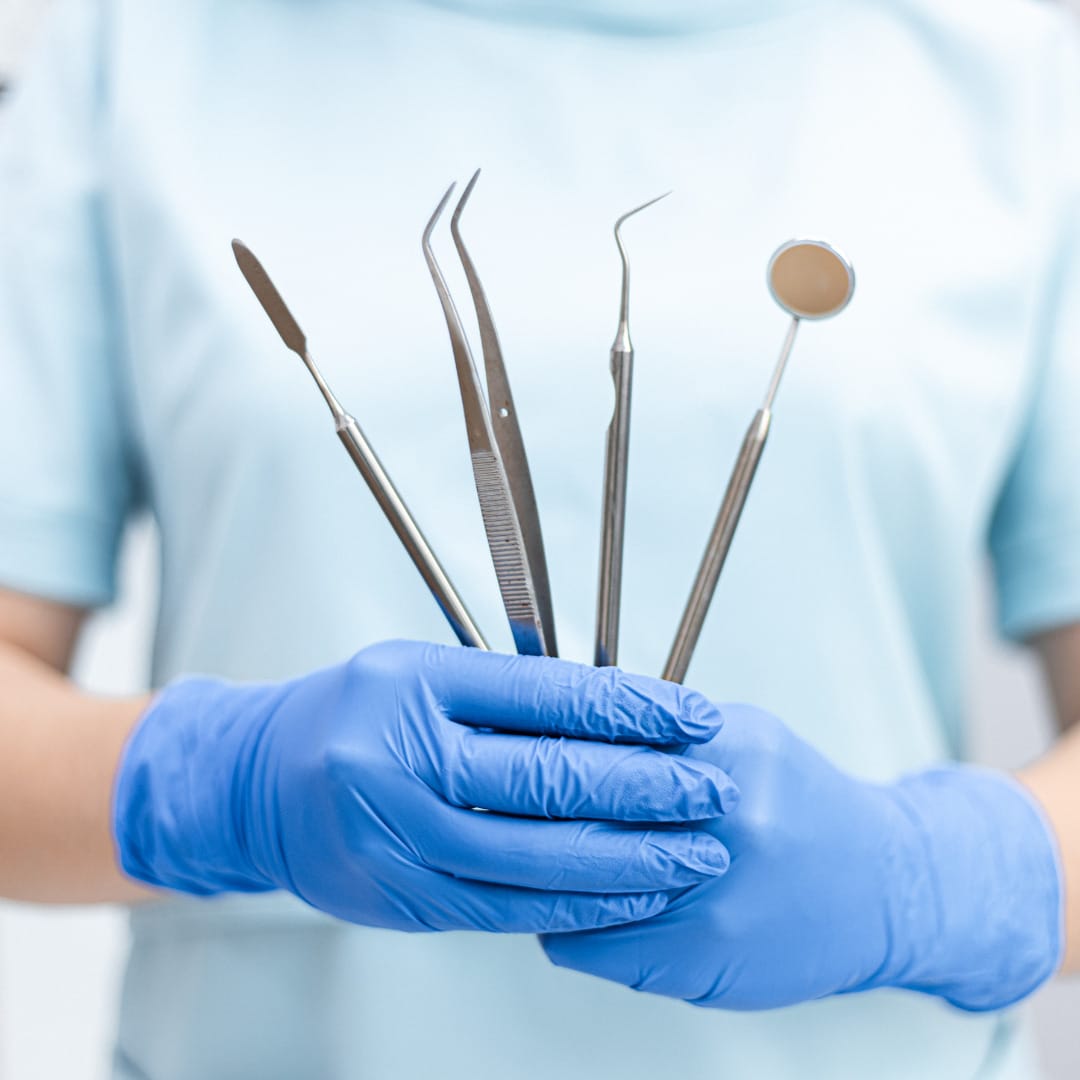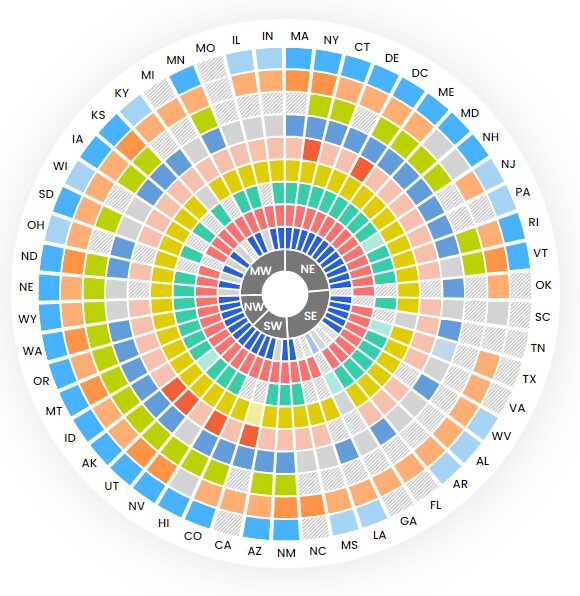Have you ever considered getting a new nurse practitioner (NP) license and traveling to a state you have never been to before? It’s time to make it happen! Because each state has a different license process, license timeframes can vary from state to state. We’ll cover the easiest states to get an NP license as well as general license criteria. But don’t handle licensing alone! Barton Associates has a dedicated licensing and credentialing team will help you get a new license and will even pay for it. Our team has helped nurse practitioners obtain thousands of state licenses. All you need to do is show up and work!
How Do You Get a Nurse Practitioner License?
Every state requires two core components to obtain a nurse practitioner license: an RN license and a graduate degree in an NP role. Beyond that criteria, licensure requirements depend heavily on specific state regulations and requirements.
NP License Requirements by State
As you might suspect, the states with the fewest additional requirements tend to have the quickest timelines for procuring an NP license. These are the most notable criteria that vary on a state-by-state basis:
National Certification:
Almost every state requires a national certification as part of the licensure process. The two states that do not, Kansas and Indiana, are generally regarded as two of the easiest states to get a license.
Fingerprints:
The majority of states require fingerprints, which can add time to the licensing timeline. Notably, two of the fastest states, Vermont and Utah, do not require fingerprints as a component of NP licensure.
Controlled Substance Registration (CSR):
About half of states require the NP to apply for a CSR specific to the state. The timeframe for CSR application can vary from 2 weeks to 2 months, so those states without a CSR requirement tend to have significantly quicker turnaround times.
Collaboration Criteria:
Collaborator approval is the other factor most likely to extend the licensing timeline. While 28 states allow nurse practitioners to practice independently, many states still require collaborator approval and collaboration paperwork. In some states, this can take 6 weeks or more.
How To Get a Nurse Practitioner License In Another State
NP programs and degrees are designed to fulfill the requirements of national certification, making it fairly easy to achieve an NP license in multiple states.
Additionally, most states offer NP-friendly processes for achieving temporary or permanent licensure. In the wake of COVID-19, many states loosened these restrictions even further and many of those programs still exist today.
To get an idea of what different states require, here’s a chart of the requirements for some of the quickest states: those that take 6 weeks, and those that take 8 weeks.
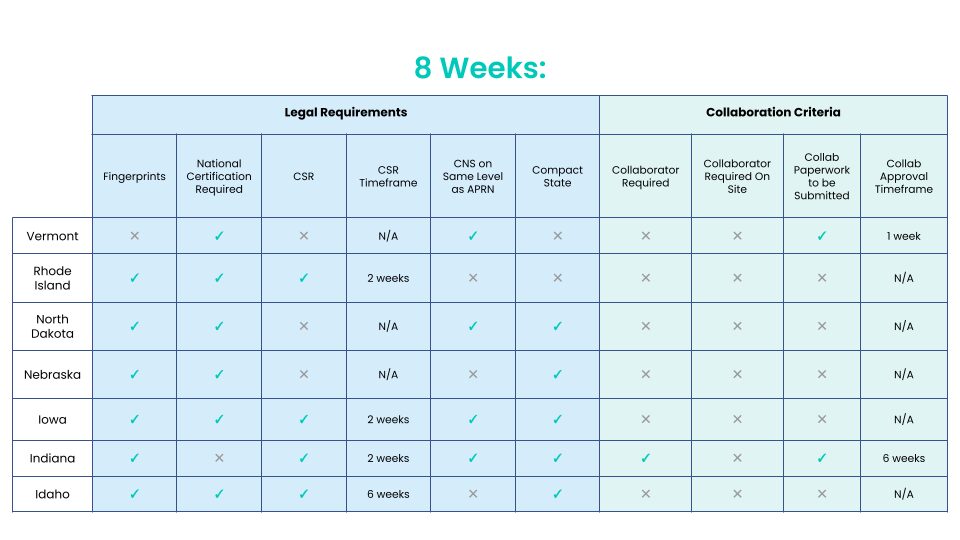
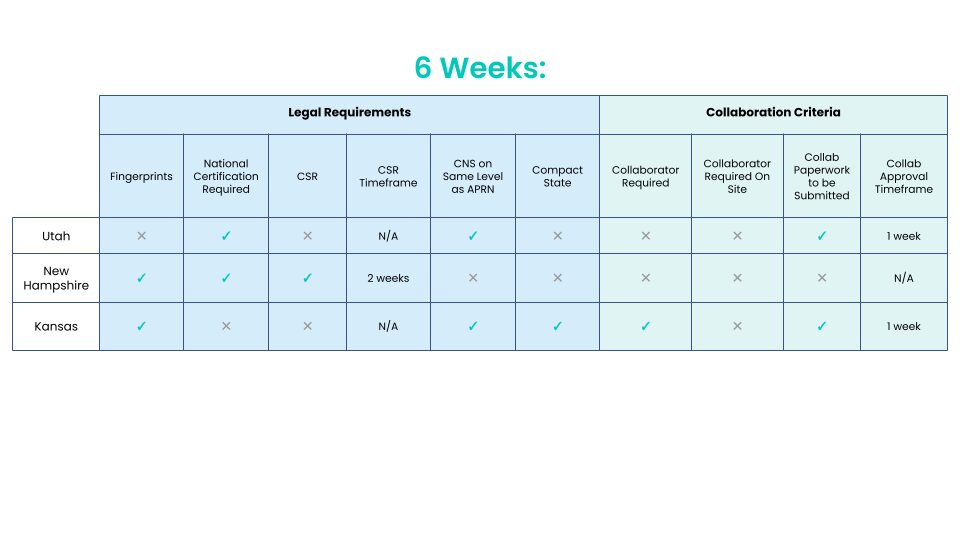
Is There a Way to Get an NP License in Multiple States at Once?
Presently, there’s no universal nurse practitioner license that applies to multiple states. Most states have similar NP licensing requirements, so you could theoretically apply for licensing in multiple states at the same time. These licenses come with fees, however, so few NPs choose to do this.
However, locum tenens nurse practitioner agencies like Barton Associates will often handle your licensing logistics and fees on your behalf when placing you for an assignment in a new state.
However, in the future, it may become much easier for an NP to practice in multiple states at once thanks to the APRN compact.
What is the APRN Compact?
The APRN compact allows nurse practitioners (and other advanced practice registered nurses) to become licensed in multiple states at the same time. Any nurse practitioner who is licensed in one compact state will be able to practice in any other compact state.
Which States Have an APRN Compact License?
As of early 2025, North Dakota, South Dakota, Utah, and Delaware are the only four APRN compact states, but the compact is not yet active in those states. The APRN compact only comes into effect once 7 states have enacted the legislation. Several other states are in various stages of pending legislation.
How Do NP Scope of Practice Laws Impact Licensing?
Different states offer different levels of autonomy for nurse practitioners, although the last few years have seen states move in the direction of offering more independence to nurse practitioners.
Prescriptive authority tends to be the area that tends to differ most from state to state, and often comes with the least universal requirements. Even states that otherwise offer independent practice for Nurse Practitioners might have special requirements for prescribing Schedule II drugs such as additional education or collaborative agreements with a provider. Our NP Scope of Practice Wheel contains more information on prescriptive authority. It’s also one of the many questions your rep can assist you in when working nurse practitioner jobs with Barton.
What are the Quickest States to Get an NP License?
These are the fastest states to obtain a permanent, NP license:
5. Vermont
Time frame: 4-8 weeks
Important Details:
- There are no fingerprint requirements.
- National certification is required.
- A CSR is not required
4. Kansas
Time frame: 4-6 weeks
Important Details:
- Fingerprints are required.
- National certification is not required.
- Temporary licensure is available on a case-by-case basis.
3. Virginia
Time frame: 4-6 weeks
Important Details:
- Fingerprints are required for the RN application. If NP already holds an active multi-state RN license, then fingerprints are not required for the VA NP license.
- National certification is required.
2. New Hampshire
Time frame: 4-6 weeks
Important Details:
- Fingerprints are required.
- National certification is required.
1. Utah
Time frame: 4-6 weeks
Important Details:
- Fingerprints are required.
- National certification is required.
NP License Information of Note for Other States
Indiana
The provider will need to supply a Collaborative Practice Agreement before the application for prescriptive authority as an APN license is issued. The APN needs to submit a new Collaborative Practice Agreement when there is a change of practice address and/or new collaborating physician. The collaborative agreement goes into effect as soon as it’s submitted to board – it does not need board approval. APN can practice on a National Certification on an Indiana RN license,
Kansas
The prescriptive authority form cannot be submitted until the NP license is active. Once it arrives, it processes the same day so the DEA is able to switch or issue. The collaborative agreement goes into effect as soon as submitted to the board – it does not need to be approved.
Nebraska
A temporary permit is available for both RN and APN, but an APN temporary permit or full APN license cannot be issued unless the nurse has a full Nebraska RN license or is licensed as an RN and resides in another compact state. The APN is allowed to apply for a DEA on an APN temporary permit.
Vermont
Vermont requires a graduate degree in nursing when applying for a new license. In order to be issued prescriptive authority without a collaborating physician, the NP has to have worked for 2 years non-consecutively under the supervision of another physician in Vermont or any other state. The 2 years have to be after they become nationally certified.
Want to learn more about locum tenens with Barton Associates? Fill out the form and one of our representatives will reach out to you!
Note: this blog was originally written in 2020 by Chris Keeley, and was updated with new information in 2025 by the Barton Team.
Looking for more educational nurse practitioner content? Check out our hub for nurse practitioner resources, or check out our popular guides on NP scope of practice, independent practice, and nurse practitioner specialties. And be sure to explore our nurse practitioner salary guide.

